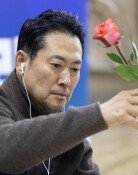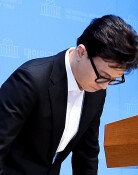Opposition parties embroiled in internal strife
Opposition parties embroiled in internal strife
Posted January. 23, 2021 07:27,
Updated January. 23, 2021 07:27
There is a growing internal feud between opposition parties ahead of the Seoul and Busan mayoral by-elections on April 7. Ahn Cheol-soo, head of the minor People’s Party, proposed an open primary as a way to field a unified opposition candidate for the Seoul mayoral by-election but main opposition People Power Party’s (PPP) emergency committee chief Kim Chong-in dismissed the idea, calling it “preposterous.” Candidates for the Busan mayoral by-election are launching slanderous attacks on one another regarding the impeachment of former President Park Geun-hye. Such sharp division between opposition parties appears to be reflected in recent opinion poll results, where opposition parties are losing approval ratings from the voters in the center.
Opposition parties’ primary race for the Seoul and Busan mayoral election is escalating into a time-consuming political battle. As for the Seoul mayoral by-election, it is hard to see candidates from both camps competing in good faith by presenting their visions and alternatives for the city administration. Instead, they are busy attacking one another, fighting over how to field a single candidate. If the situation continues, the opposition bloc could fail to field a unified candidate like they did three years ago and face the possibility of a split in conservative votes.
Opposition candidates for the Busan mayoral by-election are split into pro-Lee Myung-bak and pro-Park Geun-hye factions, fighting over the impeachment issue. They are not afraid to cast a slur on one another. There is no one within the opposition bloc who could act as a unifying influence.
The upcoming Seoul and Busan mayoral by-elections are meaningful in that they will evaluate the achievements and drawbacks of the Moon Jae-in administration, which has entered its fifth year. They are also a prelude to the presidential election slated for March next year. The opposition parties are standing at a crucial crossroads that will determine whether they could come out of their four consecutive defeats in national elections including 20th legislative elections in 2016, presidential election in 2017, local elections in 2018, and 21st legislative elections in 2020.
When it comes to organizing power, opposition parties are way behind the ruling party. In Seoul, only one head out of 25 autonomous districts is from the opposition bloc. In Busan, 13, or 81 percent, out of 16 heads of autonomous districts are from the ruling party. Historically, voter turnout in by-elections is around 30 percent. Low voter turnout means there is a high likelihood that organizing power will have a great influence on election results. If the opposition bloc continues to waste time in name calling and pulling each other down, the public will once again turn their back on them.






![[김순덕의 도발] ‘李부터 연임’ 개헌, 이 대통령은 가능성을 말했다](https://dimg.donga.com/c/138/175/90/1/wps/NEWS/IMAGE/2026/01/16/133172656.1.jpg)
